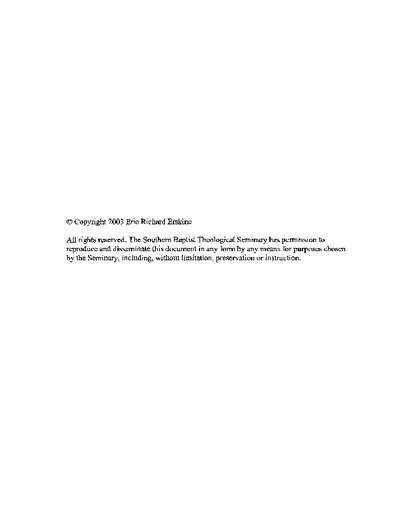| dc.description.abstract | This dissertation examines the relationship between discipleship practices a church employs and the spiritual maturation of disciples. The first chapter explores the research concern and poses seven research questions that explore the relationship between specific discipleship practices and the spiritual maturity of disciples. The six discipleship practices explored in this study were Sunday school, discipleship courses, small group ministry, preaching, mission involvement, and ministry opportunities.
The biblical foundation for discipleship and discipleship practices utilized by churches is explored. A biblical definition of a disciple is developed, providing a word study of the terms "disciple," "follower," and "imitator." An exposition of key discipleship passages in the Gospels as well as in the Epistles provides the biblical foundation for interpreting Jesus' command to "make disciples." An evaluation of the theological and educational assumptions provides a contemporary look at the issues that relate to the process of making disciples. The chapter concludes with an examination of the discipleship practices that help churches fulfill the Great Commission.
This descriptive study employed a proportional stratified sampling technique of randomly selected churches in the Florida Baptist Association in North Florida. Pastors of the randomly selected churches were surveyed to determine the discipleship practices their churches employed. Worship attendees of the same churches were surveyed using the Discipleship Inventory and an addendum to the inventory that obtained data pertinent to the self-perceived influence of discipleship practices on their spiritual growth.
Analysis of the relationship between maturity scores of respondents and the self-perceived influence of a discipleship practice focused on exploring the mean, median, mode, standard deviation, and z-score to see what relationships existed. Analysis of the influence discipleship practices had on individual respondents explored the most influential discipleship practices for each spiritual maturity level. Analysis also focused on an exploration of the major differences between the three churches that had a higher percentage of maturing believers and the three churches that had a lower percentage of maturing believers. Included in this chapter is an evaluation of the research design.
A concluding summary probes the implications and applications this study has upon discipleship practices churches employ and the influence these practices have upon the lives of disciples. Suggestions for further research are made at the conclusion of this chapter. | en_US |

